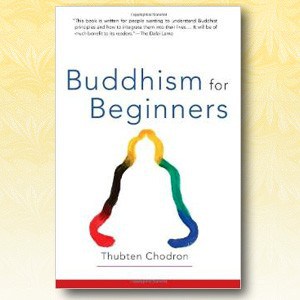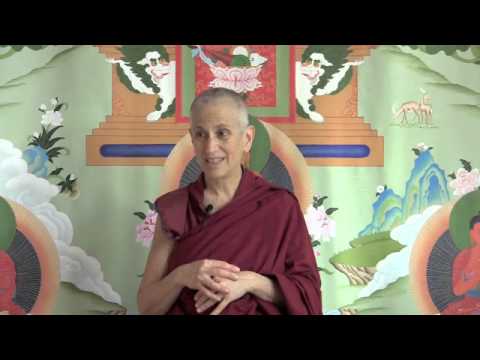On marital separation
Part of a series of short Bodhisattva's Breakfast Corner talks on the topic of trust.
- We can’t always control the way things change; sometimes we just have to accept it
- We can see possibilities in change, even if the change is unwanted
On marital separation (download)
Somebody in another country has been listening to the talks on trust, and wrote in a question. They’re having marital problems and they’re trying to deal with them, and it’s not coming together, and his wife wants to separate. I am not a marriage counselor, but I can certainly understand how painful this kind of separation is, because when the other partner wants to separate but you don’t, and especially when there are children involved. Sometimes you can get very funny dynamics—one partner blaming the other partner; somebody taking more responsibility for the breakup of the marriage than is really their responsibility; or somebody not taking enough responsibility for the break-up when it is their responsibility. These things always happen, don’t they? This is the unfortunate result of when there’s attachment and things don’t work out in the way that we would like them to.
This particular person feels like he’s really done his best, and tried, and wants to go to a marriage counselor and his wife doesn’t want to, and then, what can you do? You just have to accept the situation, that that’s it, and try to have a positive attitude. Change is the water we live in, isn’t it? We can’t always control the way things change, and make them change in the way we want them to.
The idea is, however things change, as well as we can, accept the change, and then see possibilities in it. Instead of saying, “Oh, my whole life is falling apart, I don’t know how I’m going to survive and what I’m going to do?” say, “There’s this change that I didn’t expect and don’t want, but there’s also a whole lot of new possibilities that can come about with it. There’s ways to grow as an individual, there’s a way to tap into your own internal resources, that maybe were going neglected when you were in the relationship. Or things that you were interested in but you didn’t get a chance to pursue when you were in the relationship. There’s always something new that’s going to unfold. At the beginning you may not see it, because you’re so stuck in what isn’t going to be. If you look towards the future with an attitude of hope and optimism, you may find the possibility for a lot of growth and a lot of good things coming your way.
I think the especially important thing when there are children involved, is to really say very explicitly to the children, that this is mummy and daddy’s problem, that the children are not at fault. That’s really important because sometimes, young children, they can blame themselves when mum and dad break up. One woman wrote me after her husband left, and said their four-year-old said, “Oh I know why daddy left, it was because I was naughty.” It was like, “Oh no, that’s not why daddy left.” It’s important that the kids know that it’s not because of them, and that both parents do love them. I think even when there’s separation, I think it’s so important for the sake of the children, that mum and dad get along, and not use the children as pawns to retaliate against each other for the things that the other one did or didn’t do. To really look at the children and because both parents love the children and want the best for them, and the best even in the case of separation or divorce, is for the parents to be polite and civil to each other, to speak well of each other, to not take their anger out on the children in any kind of way. If the parents can at least talk about that and agree on that, that will help them quite a bit as well as the children themselves.
You kind of have to go through the disappointment, sometimes the fear of what’s happening, sometimes the fear that you didn’t do what you should do, should’ve done what you didn’t do, and just have some acceptance and find some peace in the past, instead of re-living things and ruminating about them over and over and over again. We all make mistakes, we can own it, we can live, we can learn from them, we can go on with our lives. We don’t want to stay stuck in the past, because the past isn’t happening now. The future is in front of us, and we have a precious human life and so many good things we can do and become with this precious human life. Let’s do that.
Audience: I think that tonglen meditation is especially relevant for these kinds of situations. You can see how [inaudible]. It helps.
Venerable Thubten Chodron (VTC): She’s saying that tonglen, the taking-and-giving meditation, is very very effective in this kind of situation, where you take on the pain, not only of your spouse or ex-spouse, but of everybody else who is in a similar situation, and you give them your happiness. To really do this taking and giving meditation, because this situation of marital discord and marital break-up is so prominent. Many people go through it. If you think of all the pain of all the people who are having this situation, and you think, “As long as I’m suffering, may I take their pain on myself. As long as I have good things and happiness in my life, may I multiply those and give them to all those other people who are going through the same thing that I’m going through.”
Do it for the people who are on the side that you’re on, of its being a change you don’t want. Do the taking and giving for the people on the other side, the side of they want the change. That would be your spouse, or ex-spouse, and everybody else who wants change in their relationships. Try and see the situation from many different angles and perspectives, and realize that everybody in one way or another is suffering. Everybody wants happiness, so make it a universal thing and really think that you can take on others’ misery and give them your happiness, and that they receive—because you multiply your possessions and your virtue and your body and send it out to everybody—and think that they receive it, that it soothes their pain and gives them hope and so on.
Audience: The other thing I find really helpful is the thought that you can truly love the other person if you have a true sense of loving-kindness, and to be able to understand that maybe it’s not best for that person to be in that situation, it’s best for them to leave.
VTC: Saying that if you really have a sense of true loving-kindness, that you may see that it may not be best for that person to stay in the relationship, or that they need that kind of change. Our difficulty in seeing this, is because there’s so much attachment mixed in with our love. We want that person to be happy, but we want them to be happy with us. We don’t want them to be happy with somebody else, or in some other kind of way. It’s like, we want to them be happy, but with us, in this relationship. Learning to loosen that, and free ourselves from that attachment and really wish them well. They’re also going forward into the unknown, just as we are. To really wish them well, and wish ourselves well at the same time.
Venerable Thubten Chodron
Venerable Chodron emphasizes the practical application of Buddha’s teachings in our daily lives and is especially skilled at explaining them in ways easily understood and practiced by Westerners. She is well known for her warm, humorous, and lucid teachings. She was ordained as a Buddhist nun in 1977 by Kyabje Ling Rinpoche in Dharamsala, India, and in 1986 she received bhikshuni (full) ordination in Taiwan. Read her full bio.


